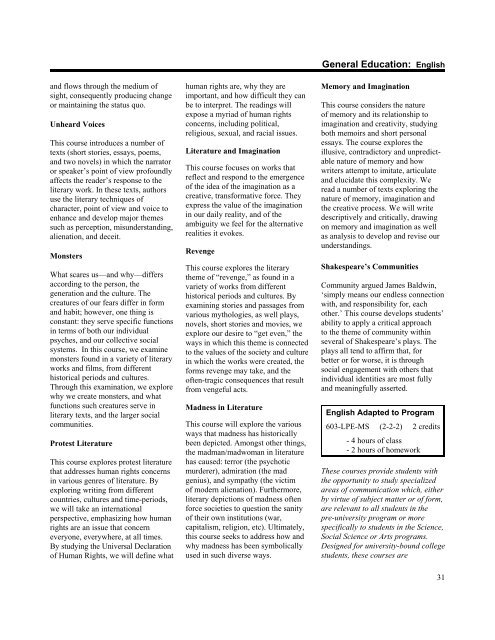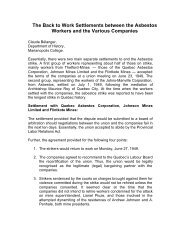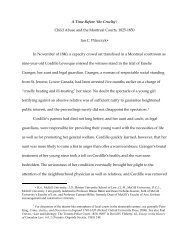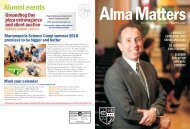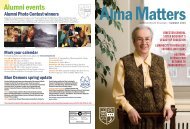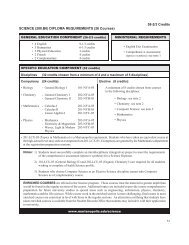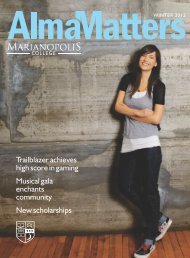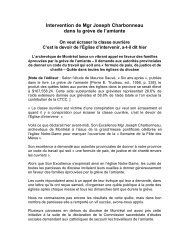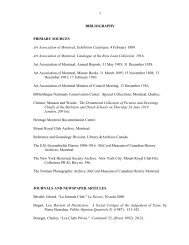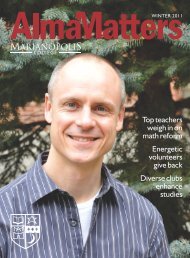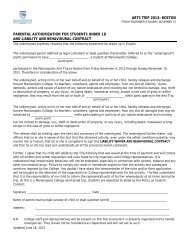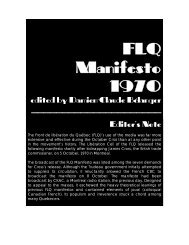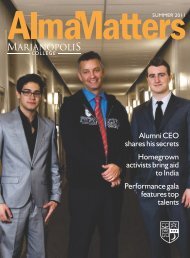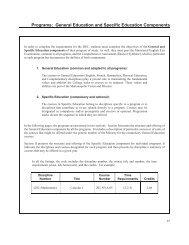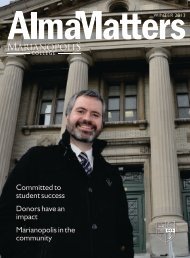General Education: Englishas the figurative expression of themesrelated to honesty and deception, andshifting views of transgressions ofaccepted order. As part of thisthematic focus, we will consider howthe subversive nature of the figure ofthe liar and thief is both a reflectionof and response to social values.The Beat GenerationThe Beat movement in literaturebegan in the mid-1950s as a responseto the post-war conservatism of theUnited States. The writings of itsseminal figures, Kerouac, Ginsberg,Corso, Snyder and others deal withthe relationship of the individual tosociety, aspects of which includea questioning of political values,sexual and religious norms, and theintroduction of non-western culturaltraditions and popular culture into theAmerican consciousness. Throughouttheir study, students assess theinfluence of the Beats on popularculture, particularly the folk musicand rock ‘n’ roll of the 60s and 70s.MetamorphosisMetamorphosis is defined as ‘radicalchange or transformation’ and hasconcerned writers from ancientGreece to the present. Studentsanalyze works of fiction, non-fiction,and poetry in order to recognize aconnection between the theme ofmetamorphosis and the values of thesociety and cultures in which theseworks were created. The objectivesof the course are to provide studentswith a method of explicating literarytexts from a thematic perspective, andexpressing what they have learned inwritten and oral work.Bare SurvivalStudents will explore the theme of“bare survival” in Canadian literature,or what one critic calls literature “notabout those who made it, but thosewho made it back.” We will analyzeperceived differences betweenCanadian, American, and Britishculture before identifying ways inwhich Canadian literature differsfrom its cultural influences. Wewill then examine bare survival subthemessuch as nature as enemy,animal as victim, the “noble savage”and other solitudes. We will alsoapply renowned critical approachesto selected texts.Betwixt and Between: Liminalityand Rites of PassageNo longer in high school but not yetin university, CEGEP students are ina situation Arnold van Gennep mightsay resembles the liminal phase of arite of passage, a period of transitionbetween two states. Expanding vanGennep’s ideas, Victor Turner arguesthat liminality or being “betwixt andbetween” characterizes much of thehuman experience. Students willexplore the theme/concept ofliminality through the literature andcinema of war, Renaissance politicsand fantasy.Sounding Off: Representations ofPopular Music in LiteratureIn this course, students study howpopular music informs contemporaryliterature on both literal and figurativelevels. Through close reading of thetexts and related materials, studentsexamine, among other themes, howmusic can fill people’s needs to belongbut not conform to family/socialgroups; how the emotional immediacyof music affects its use and misuse bymusicians and fans, and how musicoperates as a source of profoundsanctuary as well as a proving groundfor talent and courage.Misanthropy in LiteratureThis course is an exploration ofmisanthropy – a dislike and/or distrustof people – as it has appearedthroughout several literary genres andhistorical periods. Each text coveredin the course puts forward its own listof humanity’s flaws, theories as totheir origins, fears and frustrationsconcerning their consequences, andsuggestions as to what can be doneeither to remedy the situation or tocope. This focus is used to hone thestudent’s use of literary analysis andunderstanding of the impact ofhistorical context and genre onthematic concerns.Images of WomenThis course will explore representativeimages of women in nineteenthandtwentieth-century fiction (poems,short stories, and a play). Throughthis exploration of images of women,we will uncover images of men. Wewill look at the ways in which variousauthors accept or challenge, throughtheir depictions of women and menand situations, the traditionalstereotypes held for both genders.Ultimately, the course will examinethe legacy of the Adam and Evearchetypes, a legacy that has shapedour present gender relations.Power and SightThis course will introduce students toliterary texts that have a thematicfocus on the methods and means bywhich vision – seeing and being seen– interacts with power. Throughconcepts including exhibition, socialperception, and the way in whichpeople are hidden or hide from view,as well as the literary techniques suchas character and setting, we willconsider the ways in which power inrelationships and communities shifts30
and flows through the medium ofsight, consequently producing changeor maintaining the status quo.Unheard VoicesThis course introduces a number oftexts (short stories, essays, poems,and two novels) in which the narratoror speaker’s point of view profoundlyaffects the reader’s response to theliterary work. In these texts, authorsuse the literary techniques ofcharacter, point of view and voice toenhance and develop major themessuch as perception, misunderstanding,alienation, and deceit.MonstersWhat scares us—and why—differsaccording to the person, thegeneration and the culture. Thecreatures of our fears differ in formand habit; however, one thing isconstant: they serve specific functionsin terms of both our individualpsyches, and our collective socialsystems. In this course, we examinemonsters found in a variety of literaryworks and films, from differenthistorical periods and cultures.Through this examination, we explorewhy we create monsters, and whatfunctions such creatures serve inliterary texts, and the larger socialcommunities.Protest LiteratureThis course explores protest literaturethat addresses human rights concernsin various genres of literature. Byexploring writing from differentcountries, cultures and time-periods,we will take an internationalperspective, emphasizing how humanrights are an issue that concerneveryone, everywhere, at all times.By studying the Universal Declarationof Human Rights, we will define whathuman rights are, why they areimportant, and how difficult they canbe to interpret. The readings willexpose a myriad of human rightsconcerns, including political,religious, sexual, and racial issues.Literature and ImaginationThis course focuses on works thatreflect and respond to the emergenceof the idea of the imagination as acreative, transformative force. Theyexpress the value of the imaginationin our daily reality, and of theambiguity we feel for the alternativerealities it evokes.RevengeThis course explores the literarytheme of “revenge,” as found in avariety of works from differenthistorical periods and cultures. Byexamining stories and passages fromvarious mythologies, as well plays,novels, short stories and movies, weexplore our desire to “get even,” theways in which this theme is connectedto the values of the society and culturein which the works were created, theforms revenge may take, and theoften-tragic consequences that resultfrom vengeful acts.Madness in LiteratureThis course will explore the variousways that madness has historicallybeen depicted. Amongst other things,the madman/madwoman in literaturehas caused: terror (the psychoticmurderer), admiration (the madgenius), and sympathy (the victimof modern alienation). Furthermore,literary depictions of madness oftenforce societies to question the sanityof their own institutions (war,capitalism, religion, etc). Ultimately,this course seeks to address how andwhy madness has been symbolicallyused in such diverse ways.General Education: EnglishMemory and ImaginationThis course considers the natureof memory and its relationship toimagination and creativity, studyingboth memoirs and short personalessays. The course explores theillusive, contradictory and unpredictablenature of memory and howwriters attempt to imitate, articulateand elucidate this complexity. Weread a number of texts exploring thenature of memory, imagination andthe creative process. We will writedescriptively and critically, drawingon memory and imagination as wellas analysis to develop and revise ourunderstandings.Shakespeare’s CommunitiesCommunity argued James Baldwin,‘simply means our endless connectionwith, and responsibility for, eachother.’ This course develops students’ability to apply a critical approachto the theme of community withinseveral of Shakespeare’s plays. Theplays all tend to affirm that, forbetter or for worse, it is throughsocial engagement with others thatindividual identities are most fullyand meaningfully asserted.English Adapted to Program603-LPE-MS (2-2-2) 2 credits- 4 hours of class- 2 hours of homeworkThese courses provide students withthe opportunity to study specializedareas of communication which, eitherby virtue of subject matter or of form,are relevant to all students in thepre-university program or morespecifically to students in the Science,Social Science or Arts programs.Designed for university-bound collegestudents, these courses are31
- Page 2 and 3: VISIONMarianopolis College, drawing
- Page 4 and 5: GENERAL INFORMATION: Introduction t
- Page 6 and 7: AdmissionsOUT-OF-PROVINCEAPPLICANTS
- Page 8 and 9: Financial Information• Birks Fami
- Page 10 and 11: Financial InformationConfirmation F
- Page 12 and 13: Academic Information• Failure (EC
- Page 14 and 15: Academic InformationThose who are a
- Page 16 and 17: Rules and Regulationsand whether su
- Page 18 and 19: EDUCATIONAL RESOURCES & SERVICESAss
- Page 20 and 21: Educational Resources and ServicesS
- Page 22 and 23: CHOOSING A PROGRAMDiploma Programs
- Page 24 and 25: CertificatesSpecial InterestCertifi
- Page 26 and 27: Programs: General Education and Spe
- Page 28 and 29: General EducationGENERAL EDUCATION
- Page 30 and 31: General Education: Englishidentifyi
- Page 34 and 35: General Education: Englishintended
- Page 36 and 37: General Education: Frenchand curren
- Page 38 and 39: General Education: Frenchce cours t
- Page 40 and 41: General Education: HumanitiesHumani
- Page 42 and 43: General Education: Humanitiesunders
- Page 44 and 45: General Education: Humanitiespracti
- Page 46 and 47: General Education: Humanitiespracti
- Page 48 and 49: General Education: Physical Educati
- Page 50 and 51: General Education: ComplementaryCom
- Page 52 and 53: General Education: ComplementaryMod
- Page 54 and 55: SECTSpecificEducation Component- Sc
- Page 56 and 57: Science: Biology - ChemistryBiology
- Page 58 and 59: Science: Mathematics - PhysicsR and
- Page 60 and 61: 56-2/3 to 58 CreditsSOCIAL SCIENCE
- Page 62 and 63: Social Science: Profiles - General
- Page 64 and 65: Social Science: Psychology ProfileE
- Page 66 and 67: Social Science: Law, Society and Ju
- Page 68 and 69: Social Science: Honours CommerceHon
- Page 70 and 71: Social Science: Anthropology - Biol
- Page 72 and 73: Social Science: History - Mathemati
- Page 74 and 75: Social Science: Political Sciencedi
- Page 76 and 77: Social Science: Religion - Sociolog
- Page 78 and 79: 54-2/3 CreditsCREATIVE ARTS, LITERA
- Page 80 and 81: Creative Arts, Literature and Langu
- Page 82 and 83:
Creative Arts, Literature and Langu
- Page 84 and 85:
Creative Arts, Literature and Langu
- Page 86 and 87:
Creative Arts, Literature and Langu
- Page 88 and 89:
Creative Arts, Literature and Langu
- Page 90 and 91:
Creative Arts, Literature and Langu
- Page 92 and 93:
58-2/3 CreditsMUSIC (501.A0) DIPLOM
- Page 94 and 95:
MusicEar Training and Theory IV551-
- Page 96 and 97:
59-1/3 CreditsARTS AND SCIENCES (70
- Page 98 and 99:
Arts and Sciences: English - Humani
- Page 100 and 101:
Arts and Sciences: Art History - Ar
- Page 102 and 103:
Arts and Sciences: Mathematics - Mu
- Page 104 and 105:
Arts and Sciences: Multidisciplinar
- Page 106 and 107:
56-2/3 to 58 CreditsLIBERAL ARTS (7
- Page 108 and 109:
Liberal Artsof evolution; the first
- Page 110 and 111:
Liberal ArtsOptionalIn addition to
- Page 112 and 113:
Teaching FacultyFLEISCHER, George T
- Page 114 and 115:
Teaching FacultyTRILLER, Bernice Sh
- Page 116:
INDEX II: Programs and CoursesGener


